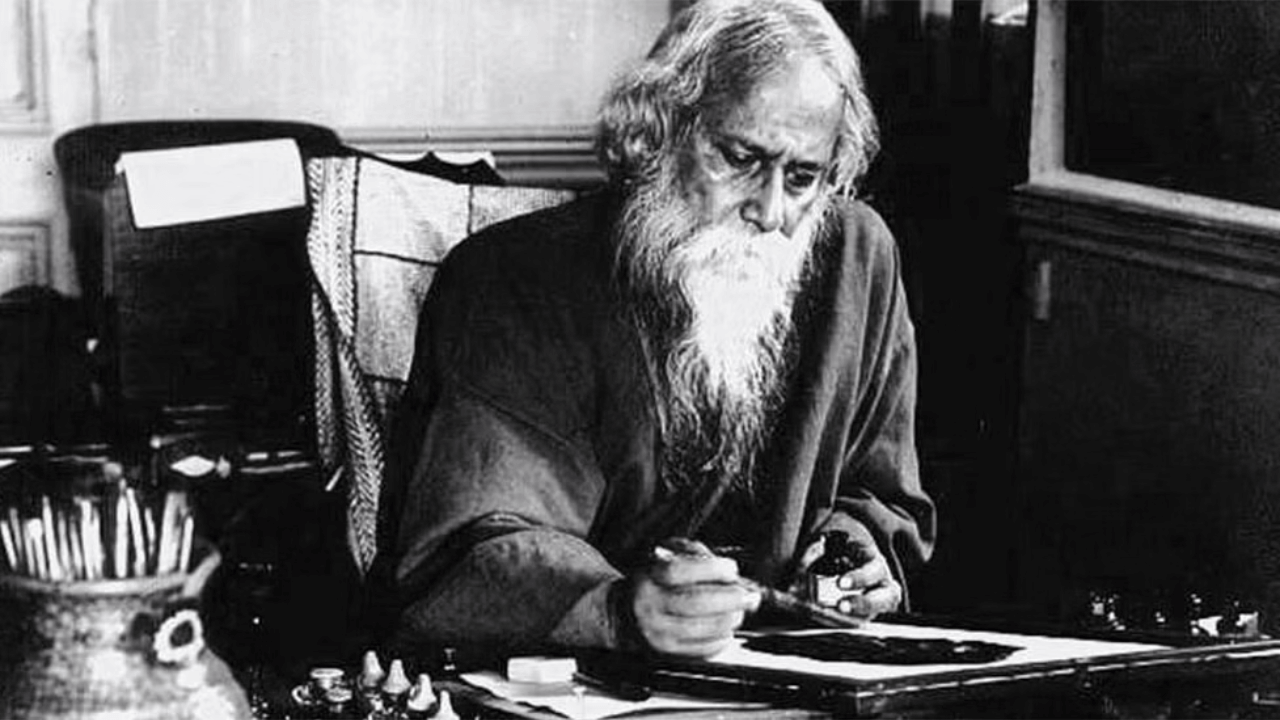Rabindranath Tagore Jayanti is an important event that marks the birthday celebration of Rabindranath Tagore. He was a renowned poet, writer, philosopher, and social reformer who contributed significantly to India’s cultural and literary heritage. Tagore’s works have gained worldwide recognition, and he is considered one of the most eminent literary figures in the world. His birth anniversary is celebrated as a tribute to his remarkable contributions in various fields.
About Rabindranath Tagore
- Rabindranath Tagore was born on 7th May 1861 in Calcutta (now Kolkata).
- He was known by several names such as ‘Gurudev’, ‘Kabiguru’, ‘Biswakabi’, and ‘Bard of Bengal’.
- Tagore was a Bengali poet, novelist, and painter who had a significant influence in introducing Indian culture to the West.
- He was a polymath and reshaped the literature and music of the region.
- Tagore was a good friend of Mahatma Gandhi and is believed to have given him the title of Mahatma.
- He believed that unity in diversity was the only way to achieve national integration in India.
- Tagore spoke at the World Parliament for Religions in 1929 and 1937.
- He died on 7th August 1941 in Calcutta.
Why is his Jayanti not celebrated on 7th May?
- Rabindranath Jayanti is celebrated on May 7 by some organizations and in some places to commemorate Rabindranath Tagore’s birth anniversary according to the Gregorian calendar.
- In West Bengal, Rabindra Jayanti is celebrated on the 25th day of the Bengali month Boishakh or “Ponchishe Boishakh” according to the traditional Bengali calendar.
- This year, Rabindra Jayanti falls on May 9, as per the Bengali calendar which marks the 162nd birth anniversary of Rabindranath Tagore.
- Tagore’s birth anniversary is celebrated with great enthusiasm in West Bengal, and various cultural programs and competitions are organized to mark the occasion.
His Contributions
- Rabindranath Tagore is known to have composed over 2000 songs which are called ‘Rabindra Sangeet’ with its own distinct lyrical and fluid style.
- He is responsible for modernizing Bengali prose and poetry, and his notable works include Gitanjali, Ghare-Baire, Kabuliwala, Gora, Manasi, Balaka, and Sonar Tori.
- He began writing poetry at the age of eight and published his first poems at the age of 16 under the pen name ‘Bhanusimha’.
- He is also remembered for his song ‘Ekla Chalo Re’.
- Rabindranath Tagore not only gave the national anthems for India and Bangladesh but also inspired a Ceylonese student of his to pen and compose the national anthem of Sri Lanka.
- Rabindranath Tagore founded a school on December 22, 1901, at Santiniketan with five students, including his eldest son, and five teachers. He named it Brahmacharya Ashram in the tradition of ancient forest hermitages.
- Besides all his literary achievements, he was also a philosopher and educationist who established the Vishwa-Bharati University in 1921, a university that challenged conventional education.
- Rabindranath Tagore was not only a literary figure but also a philosopher.
- He wrote on diverse topics such as politics, education, and spirituality.
- His philosophical works include “Sadhana: The Realization of Life,” “The Religion of Man,” and “Nationalism.”
Awards
Rabindranath Tagore was a highly decorated figure and received numerous awards and honors throughout his life, some of which are:
- Nobel Prize in Literature (1913) for his collection of poems, Gitanjali.
- He was the first non-European to receive the Nobel Prize.
- Knighthood from the British government (1915), which he later renounced in protest against the Jallianwala Bagh massacre (1919).
- The Padma Bhushan (1915) and the Padma Vibhushan (1941) from the Indian government.
- The D.Litt. (honoris causa) from the University of Oxford (1940).
- The Order of Merit from the British government (1941).
- The Visva-Bharati College, founded by Tagore in 1921, was designated as a Central University by an act of Parliament in 1951 and was renamed Visva-Bharati University in 1953.
- It is a public research center and an Institution of National Importance located in Shantiniketan, West Bengal.
- The Sahitya Akademi Fellowship (1954), is India’s highest literary honor.
His Quotes
- “You can’t cross the sea merely by standing and staring at the sea.”
- “Don’t limit the child to your own learning, for he was born in another time.”
- “If I can’t make it through one door, I’ll go through another door- or I’ll make a door. Something terrific will come no matter how dark the present.”
- “Facts are many, but the truth is one”.
- 3 August Current Affairs 2023 in English
- MoU Between Subroto Mukerjee Sports and Education Society and All India Football Federation (AIFF) to Promote Football at Grassroot Level
- Dr. Mansukh Mandaviya Delivers Keynote Address at the 13th Indian Organ Donation Day ceremony
- Education Ministry Forms Expert Panel on Anti-Discrimination in Higher Education
- Concerns Arise Over Cheetah Deaths at Kuno National Park
FAQs
Which year did Rabindranath Tagore get Nobel Prize?
Rabindranath Tagore was awarded the Nobel Prize in Literature in 1913, becoming the first non-European to receive the award. The Swedish Academy cited Tagore for his “profoundly sensitive, fresh and beautiful verse” and his contribution to the literary and cultural heritage of Bengal and India as a whole. Tagore’s collection of poems, Gitanjali, which was translated into English by the poet himself, was a major factor in his winning the award. The Nobel Prize was a significant recognition of Tagore’s literary talent and influence not just in India, but also internationally.
Where was Rabindranath Tagore born?
Rabindranath Tagore was born in Calcutta (now known as Kolkata), which was then the capital of British India, on May 7, 1861. Rabindranath Tagore grew up in a culturally rich and intellectually stimulating environment. His family was well-known for their literary and artistic talents, and he was exposed to a wide range of ideas and disciplines from an early age. Tagore was a precocious child and began writing poetry at the age of eight.
